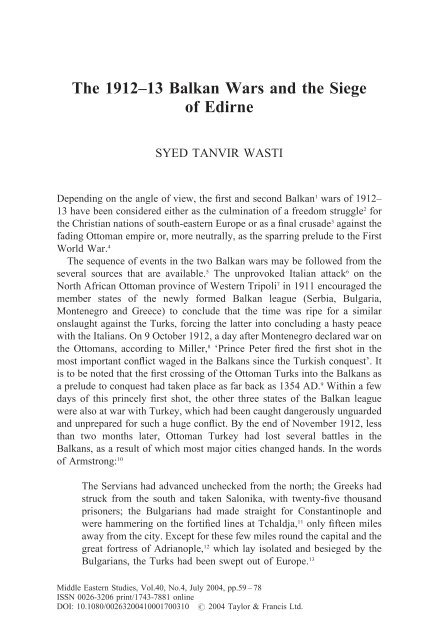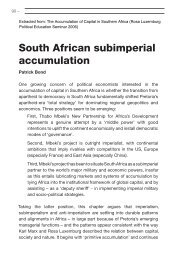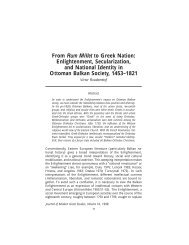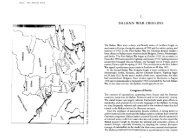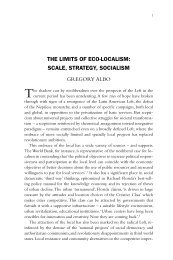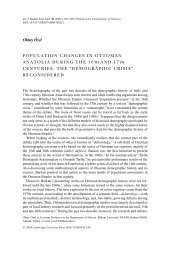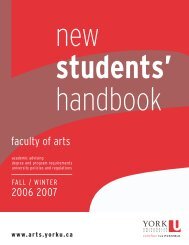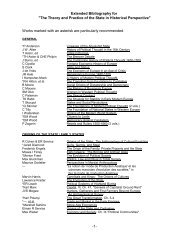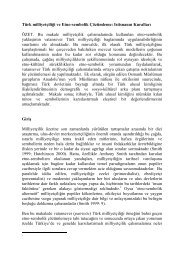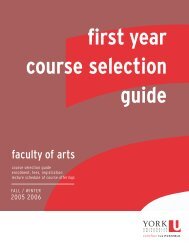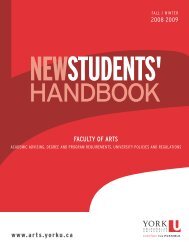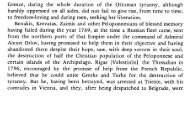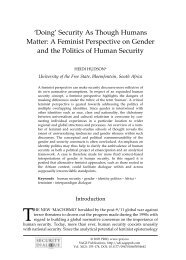Wasti, S. T. "The 1912-13 Balkan Wars and the Siege of Edirne"
Wasti, S. T. "The 1912-13 Balkan Wars and the Siege of Edirne"
Wasti, S. T. "The 1912-13 Balkan Wars and the Siege of Edirne"
You also want an ePaper? Increase the reach of your titles
YUMPU automatically turns print PDFs into web optimized ePapers that Google loves.
64 MIDDLE EASTERN STUDIEScombined with <strong>the</strong> increase in population would create enormous problems.<strong>The</strong> administration had, in fact, begun to encourage women, invalids <strong>and</strong>foreign nationals to leave <strong>the</strong> confines <strong>of</strong> Edirne voluntarily. <strong>The</strong>requisitioning <strong>of</strong> available wagons <strong>and</strong> beasts <strong>of</strong> burden had also begun.<strong>The</strong> first sounds <strong>of</strong> gunfire reached Edirne on 21 October; <strong>the</strong> war wasinching closer, <strong>and</strong> though morale remained high, womenfolk were <strong>of</strong>ten seenboarding <strong>the</strong> train for Istanbul.<strong>The</strong> train also brought <strong>the</strong> latest newspapers from <strong>the</strong> capital to an Edirnestarved <strong>of</strong> news, because <strong>the</strong> postal services were no longer functioning. Ertürsays he was depressed by <strong>the</strong> optimistic reports <strong>of</strong> <strong>the</strong> war given bynewspapers published far from <strong>the</strong> front. In Edirne, wounded Turkish soldiershad already begun to arrive on 23 October. 49 By 25 October, army unitsrepositioned <strong>the</strong>mselves within <strong>the</strong> confines <strong>of</strong> Edirne in preparation for asiege like Plevna. No word was to be had about <strong>the</strong> army units supposed to becoming from <strong>the</strong> east to relieve <strong>the</strong> pressure on Edirne. Rakım Ertür <strong>and</strong> afriend, Mazhar by name, went to <strong>the</strong> French hospital to visit a mutual friend,an artillery captain called İsmail Hakkı, who had been wounded in anencounter in which he showed great bravery. Although İsmail Hakkı hadtaken his guns to within pistol range <strong>of</strong> <strong>the</strong> enemy <strong>and</strong> routed <strong>the</strong>ir positions,he had much respect for <strong>the</strong> Bulgarian fighters, calling <strong>the</strong>m ‘<strong>the</strong> Japs <strong>of</strong> <strong>the</strong><strong>Balkan</strong>s’. While intermittent heavy skirmishing continued all around, <strong>the</strong>next blow fell on 4 November when <strong>the</strong> Bulgarians cut <strong>of</strong>f <strong>the</strong> water supply<strong>of</strong> Edirne, forcing people to use water from <strong>the</strong> river <strong>and</strong> from wells. A warmwater bath became a luxury. Sugar <strong>and</strong> salt were <strong>the</strong> next ‘casualties’ <strong>of</strong> <strong>the</strong>siege – <strong>the</strong>ir disappearance from <strong>the</strong> shops was occasioned by <strong>the</strong> threat thatblack marketeers would be court-martialled. On 9 November, while on a getwellvisit to <strong>the</strong> house <strong>of</strong> <strong>the</strong> artillery captain İsmail Hakkı, Ertür had <strong>the</strong>opportunity <strong>of</strong> encountering both Remzi Bey <strong>and</strong> Fuat Bey, who arrived toenquire after <strong>the</strong> captain. <strong>The</strong> <strong>of</strong>ficers discussed military matters in French fora while <strong>and</strong> though Rakım Ertür knew no French, he found out that <strong>the</strong> armyhad decided to pull back tactically to Çatalca. This caused him muchdespondency. On 15 November, a Bulgarian plane flew over <strong>the</strong> Edirne skies,showering leaflets below containing <strong>the</strong> following message:We have surrounded Edirne with a thous<strong>and</strong> guns. Come <strong>and</strong> surrender.O people <strong>of</strong> Edirne, we shall save you from your despotic <strong>of</strong>ficials. <strong>The</strong>Bulgarian armies are victorious everywhere. 50It was in response to this propag<strong>and</strong>a that Şükrü Pasha issued his ownproclamations. 51On 16 November, long queues were observed for <strong>the</strong> first time for <strong>the</strong>purchase <strong>of</strong> bread from <strong>the</strong> various ovens <strong>and</strong> bakeries. Black marketeering
<strong>1912</strong>–<strong>13</strong> BALKAN WARS 65<strong>and</strong> hoarding <strong>of</strong> foodstuffs <strong>and</strong> tobacco products developed. As a man witha strong religious background, Ertür is extremely critical about those who,with a city under bombardment <strong>and</strong> fires breaking out everywhere, canforget <strong>the</strong>ir morals <strong>and</strong> decency in <strong>the</strong> selfish desire to make a fast buck.<strong>The</strong> Muslim feast <strong>of</strong> ‘Id al Adha took place on 20 November <strong>and</strong> moreanimals than usual were sacrificed because hay <strong>and</strong> fodder were no longeravailable for <strong>the</strong> animals. 52 Expeditions conducted by small guerilla groupsoutside <strong>the</strong> precincts <strong>of</strong> <strong>the</strong> fortified city in order to obtain foodstuffs <strong>and</strong>fodder usually met with no success, but <strong>of</strong>ten came under heavy enemy fire.<strong>The</strong> first shells from <strong>the</strong> Bulgarian guns whistled over <strong>the</strong> fortifications <strong>and</strong>fell within <strong>the</strong> confines <strong>of</strong> Edirne on 21 November creating explosions <strong>and</strong>smoke. <strong>The</strong> bombardment was to continue with increasing intensity <strong>and</strong>frequency in succeeding days <strong>and</strong> weeks, creating a movement <strong>of</strong> <strong>the</strong>population within <strong>the</strong> walled areas to houses which were relatively safer.<strong>The</strong> heavy shelling led Şükrü Pasha to issue a fresh proclamation which,according to Ertür, did little to raise <strong>the</strong> spirits <strong>of</strong> <strong>the</strong> population. 53 For <strong>the</strong>poor soldiers being besieged <strong>the</strong> bombardment was like a round <strong>the</strong> clockvigil, but even for ordinary citizens, <strong>the</strong> incessant one-sided bombardmentslowly turned into a routine. Fires broke out, soldiers <strong>and</strong> civilians werewounded, <strong>and</strong> those who died, whe<strong>the</strong>r from <strong>the</strong> shelling or from naturalcauses, were carried to <strong>the</strong>ir graves.Ertür’s journal on 24 November records that after days <strong>of</strong> consumingsaltless food <strong>and</strong> bread he learned to prize even such a humble commodityas salt. Of course, he does not fail to mention that <strong>the</strong> size <strong>of</strong> <strong>the</strong> breadloaves continued to shrink, <strong>and</strong> <strong>the</strong>ir quality to deteriorate. People beganto carry sugar in little paper bags in <strong>the</strong>ir pockets, because cafes whichserved tea <strong>and</strong> c<strong>of</strong>fee had no stocks <strong>of</strong> sugar left. <strong>The</strong> hopelessness <strong>of</strong><strong>the</strong>ir condition led to occasional loss <strong>of</strong> appetite, but <strong>the</strong> craving fortobacco never disappeared, <strong>and</strong> asserted itself whe<strong>the</strong>r one was happy ormiserable.On 2 December, along with an interlude in <strong>the</strong> bombardment, <strong>the</strong>re wererumours <strong>of</strong> a possible ceasefire. News was telegraphed from Istanbul that aBulgarian military delegation would arrive for some negotiations with <strong>the</strong>Edirne comm<strong>and</strong>. Major Kâzım was instructed to receive <strong>the</strong> delegation <strong>and</strong>Ertür later learned that <strong>the</strong> Bulgarians had asked <strong>the</strong> Turkish forces tosurrender <strong>the</strong> fortress <strong>of</strong> Edirne with full honour. Major Kâzım was alsoasked to deliver an envelope to Şükrü Pasha, but he refused scornfully,saying:We have not yet given battle for <strong>the</strong> control <strong>of</strong> <strong>the</strong> fortress, <strong>and</strong> willdefend it till <strong>the</strong> last man. We have not sought this meeting. We wouldlike to face ei<strong>the</strong>r a real friend or a serious enemy.
<strong>1912</strong>–<strong>13</strong> BALKAN WARS 67advantage <strong>of</strong> <strong>the</strong> ceasefire to tour <strong>the</strong> surroundings <strong>of</strong> Edirne, but wasdepressed by <strong>the</strong> poor quality <strong>of</strong> <strong>the</strong> fare consumed by <strong>the</strong> soldiers. In hisdiary entry for 6 January, he says that <strong>the</strong> citizenry had been reduced tosimple bread <strong>and</strong> cheese, as even money could not buy anything else. On <strong>13</strong>January, a friend <strong>of</strong> Ertür, Cemil by name, finally ransacked <strong>the</strong> house <strong>of</strong> hisfa<strong>the</strong>r-in-law who had departed for Istanbul <strong>and</strong> came up with a supply <strong>of</strong> salt<strong>and</strong> sugar. A consequence <strong>of</strong> this loot was a surreptitious feast <strong>of</strong> helva 55 forErtür, Cemil <strong>and</strong> a couple <strong>of</strong> friends.On 17 January, <strong>the</strong> rumour spread that <strong>the</strong> ‘powers that be’ had pronouncedthat Edirne was ultimately to be surrendered to <strong>the</strong> Bulgarians, causing greatunease. A telegram to <strong>the</strong> Edirne comm<strong>and</strong> had indicated this possibility <strong>and</strong>mentioned that if <strong>the</strong> fort held out for ano<strong>the</strong>r month it might result in someadvantage in <strong>the</strong> political bargaining. <strong>The</strong> prospect <strong>of</strong> <strong>the</strong> loss <strong>of</strong> Edirne was asource <strong>of</strong> deep pain <strong>and</strong> worry to Ertür. Rumours continued that <strong>the</strong> soldiersdefending Edirne might be tempted to resort to violence or guerilla tactics. Aweek later, on 24 January, came <strong>the</strong> news <strong>of</strong> <strong>the</strong> toppling <strong>of</strong> <strong>the</strong> government<strong>of</strong> Kâmil Pasha, 56 along with renewed hopes that Edirne would not berelinquished.Over <strong>the</strong> next couple <strong>of</strong> weeks, inspection teams were formed for <strong>the</strong>requisitioning <strong>of</strong> stocks <strong>of</strong> wheat <strong>and</strong> grain from <strong>the</strong> dwellers within <strong>the</strong>fortress. A receipt was issued for each quantity <strong>of</strong> foodstuff requisitioned.Ertür was perforce a member <strong>of</strong> <strong>the</strong>se teams on <strong>the</strong> orders <strong>of</strong> Halil Bey <strong>the</strong>governor <strong>of</strong> <strong>the</strong> province. However, all this requisitioning did not result inany substantial improvement in <strong>the</strong> quality <strong>of</strong> <strong>the</strong> bread.On a visit to a café on 1 February, Ertür read a telegram that announced <strong>the</strong>appointment <strong>of</strong> İzzet Pasha as Comm<strong>and</strong>er-in-Chief along with instructionsfrom his <strong>of</strong>fice for <strong>the</strong> fortress to prepare itself once more for <strong>the</strong> immediatecommencement <strong>of</strong> active hostilities. <strong>The</strong> announcement contained anemotional appeal to <strong>the</strong> Ottomans to prove that <strong>the</strong>ir blood still flowed withvigour when it came to saving <strong>the</strong> flags <strong>of</strong> faith <strong>and</strong> state.On <strong>the</strong> basis <strong>of</strong> his first-h<strong>and</strong> information Ertür calculated that such foodsupplies as existed would last about 40 days <strong>and</strong> run out by 10 March. Someresult would surely be reached by <strong>the</strong>n, he thought, because <strong>the</strong> soldiers wereill-prepared for a long war. <strong>The</strong>y were poorly trained, underfed <strong>and</strong> weak,worried about <strong>the</strong> l<strong>and</strong>s <strong>the</strong>y had been ejected from <strong>and</strong> in most casesdesperate about <strong>the</strong>ir wives <strong>and</strong> children left behind in far-flung villages. On2 February, Ertür continued with his melancholy task <strong>of</strong> requisitioning wheatfrom <strong>the</strong> Feyzullahpaşa <strong>and</strong> Altunî districts <strong>of</strong> Edirne. According to <strong>the</strong>account <strong>of</strong> Yiğitgüden:In <strong>the</strong> early hours <strong>of</strong> <strong>the</strong> morning <strong>of</strong> Tuesday, 4 February, <strong>the</strong> Bulgarianattack commenced with ferocious cannonading. Over 150 cannonballs
<strong>1912</strong>–<strong>13</strong> BALKAN WARS 69for a crust <strong>of</strong> bread, but to little avail. Very likely <strong>the</strong> people on whosedoors <strong>the</strong>y knocked had also gone hungry that night.<strong>The</strong> end <strong>of</strong> February <strong>and</strong> <strong>the</strong> beginning <strong>of</strong> March brought intermittentshelling punctuated by snowfall. Ertür was not impressed by <strong>the</strong> inspectionvisits paid by <strong>the</strong> Governor who was always flanked by <strong>the</strong> Director <strong>of</strong> Police<strong>and</strong> by <strong>the</strong> Kaymakam, 60 both <strong>of</strong> whom served to shield him from any directquestions. Meanwhile, <strong>the</strong> battles in <strong>the</strong> area surrounding Edirne continued torage fiercely. With <strong>the</strong> outside world crumbling about his ears, Ertür’s entriesfor <strong>the</strong> month <strong>of</strong> March become laconic <strong>and</strong> grim. On 3 March, however, hewas able to rescue a starving horse from being slaughtered by soldiers whohad no food or use for it. After a few days <strong>of</strong> feeding <strong>the</strong> animal with couchgrass, Ertür became <strong>the</strong> owner <strong>of</strong> a beautiful horse. On 19 March came <strong>the</strong>report <strong>of</strong> <strong>the</strong> assassination <strong>of</strong> <strong>the</strong> Greek King 61 in Salonica a day earlier.Finally, after weeks <strong>of</strong> shelling, <strong>the</strong> explosion <strong>of</strong> <strong>the</strong> ammunition dumpwithin <strong>the</strong> Ottoman fortified comm<strong>and</strong> <strong>and</strong> <strong>the</strong> resultant fires resulted in <strong>the</strong>surrender <strong>of</strong> Edirne on Wednesday, 26 March 19<strong>13</strong>, at <strong>13</strong>.00 hours. 62 Though<strong>the</strong> violence <strong>and</strong> plunder by <strong>the</strong> occupying Bulgarian forces continuedunabated in Edirne <strong>and</strong> its environs, <strong>the</strong> Bulgarian king Ferdin<strong>and</strong> 63 whocame to congratulate his army returned to Şükrü Pasha <strong>the</strong> ceremonial swordthat <strong>the</strong> Pasha had surrendered just a day earlier. 64During <strong>the</strong> siege <strong>of</strong> Edirne, <strong>the</strong> Bulgarians attempted to jam <strong>the</strong> radio linkbetween Istanbul <strong>and</strong> Edirne. As mentioned by Hall, 65 <strong>the</strong>y also ‘directedsome intense shelling at <strong>the</strong> European quarter <strong>of</strong> Adrianople in <strong>the</strong> hope thatforeign consuls posted in <strong>the</strong> city would pressurize Sukru Pasha to surrender’.However, it appears that both <strong>the</strong> French <strong>and</strong> British consuls 66 remainedwithin <strong>the</strong> city until all foreign nationals were assembled in <strong>the</strong> PomakSchool in Edirne on 26 March. 67 What is available from <strong>the</strong> accounts <strong>of</strong> <strong>the</strong>seconsuls indicates that <strong>the</strong> Turkish soldiers, neglecting <strong>the</strong>ir own safety,rushed to extinguish fires caused by <strong>the</strong> shells <strong>and</strong> shrapnel <strong>and</strong> valiantlyfought back throughout <strong>the</strong> siege.In Öke’s 68 collection <strong>of</strong> his own published newspaper columns, 69 <strong>the</strong>re aretwo references to Şükrü Pasha <strong>and</strong> <strong>the</strong> siege <strong>of</strong> Edirne. Lieutenant Sadık, abright young <strong>of</strong>ficer who had been chosen to convey military instructions tosave a company deprived <strong>of</strong> communication with <strong>the</strong> besieged fort <strong>of</strong> Edirne,performed his mission valiantly but was killed in <strong>the</strong> attempt. A few dayslater, his young widow, a girl <strong>of</strong> 17, turned up at <strong>the</strong> Pasha’s headquarterswith a 10 month old baby son. <strong>The</strong> Pasha himself opened <strong>the</strong> door <strong>and</strong> invitedher to sit down. But all that <strong>the</strong> proud girl requested was a chance to serve <strong>and</strong>give her own life for her country. <strong>The</strong> o<strong>the</strong>r reference relates to instructions,almost in <strong>the</strong> form <strong>of</strong> a will, 70 written down by Şükrü Pasha himself, at somestage during <strong>the</strong> siege <strong>of</strong> Edirne.
<strong>1912</strong>–<strong>13</strong> BALKAN WARS 71<strong>The</strong> subsequent recovery <strong>of</strong> Edirne on 22 July 19<strong>13</strong> was a smoothoperation 86 conducted by <strong>the</strong> Ottomans who had never accepted <strong>the</strong> fall <strong>of</strong>this historic city <strong>of</strong> mosques <strong>and</strong> monuments. 87 In <strong>the</strong> list <strong>of</strong> <strong>of</strong>ficers 88 takingpart in <strong>the</strong> overall military operation, many illustrious names <strong>of</strong> futureTurkish comm<strong>and</strong>ers may be found, including Lt. Col. Enver, 89 Lt.Col.Mustafa Kemal 90 <strong>and</strong> Lt.Col. Fahreddin. 91 Simultaneously, <strong>the</strong> area aroundKırkkilise (now Kırklareli) was recovered by forces under Fethi Okyar. 92 ATurco–Bulgarian treaty signed on 29 September 19<strong>13</strong> in Istanbul restoredEdirne <strong>and</strong> Eastern Thrace to <strong>the</strong> Ottomans. All <strong>the</strong> <strong>Balkan</strong> neighbours slowlybegan to patch up <strong>the</strong>ir differences. Nine months later, however, <strong>the</strong> shotsfired at Archduke Ferdin<strong>and</strong> <strong>and</strong> his wife in Sarajevo signalled <strong>the</strong> start <strong>of</strong> yetano<strong>the</strong>r cataclysm.NOTES1. A Turkish word meaning a mountain range containing wooded passes.2. H.C. Armstrong, Grey Wolf (An Intimate Study <strong>of</strong> a Dictator) (London: Arthur Barker, 1935)in which <strong>the</strong> following is stated on p.52: ‘All <strong>the</strong> four Christian states, suddenly, <strong>and</strong> for <strong>the</strong>only time in <strong>the</strong>ir history, attacked Turkey’.3. S. Kocabaş, <strong>Balkan</strong> Harbi–Son Haçlı Seferi [<strong>The</strong> <strong>Balkan</strong> War–<strong>The</strong> Last Crusade] (Kayseri:Vatan Yayınları, 2001).4. R.C. Hall, <strong>The</strong> <strong>Balkan</strong> <strong>Wars</strong> <strong>1912</strong>–19<strong>13</strong> – <strong>The</strong> Prelude to <strong>the</strong> First World War (London:Routledge, 2000). This sentiment is also expressed by Talat Pasha, one <strong>of</strong> <strong>the</strong> CUP‘triumvirate’ <strong>and</strong> later Gr<strong>and</strong> Vizier, in Talat Paşa‘nın Anıları [Memoirs <strong>of</strong> Talat Pasha](Istanbul: İletişim Yayınları, 1994), p.24, wherein he states:Without considering that <strong>the</strong> majority element in a large part <strong>of</strong> Albania <strong>and</strong> Macedoniawas Turkish, <strong>the</strong> 19<strong>13</strong> London conference wielded <strong>the</strong> scalpel like a deadly surgeon<strong>and</strong> freely cut up <strong>the</strong> map <strong>of</strong> <strong>the</strong> <strong>Balkan</strong>s. This operation not only did not yield <strong>the</strong>desired results, but caused <strong>the</strong> sickness to spread to o<strong>the</strong>r parts. Thus all <strong>of</strong> Europe wasaffected by an incurable illness. <strong>The</strong> <strong>Balkan</strong> War gave birth to <strong>the</strong> World War.5. W. Miller, <strong>The</strong> Ottoman Empire <strong>and</strong> its Successors, 1801–1927 (London: Frank Cass, 1966)has an extensive <strong>and</strong> excellent bibliography, pp.568–93. See also <strong>the</strong> works cited at <strong>the</strong> end<strong>of</strong> R.C. Hall (note 4). Turkish sources on <strong>the</strong> <strong>Balkan</strong> <strong>Wars</strong> are treated fully in a relativelyrecent copiously annotated <strong>and</strong> documented work: M. Naim Turfan, Rise <strong>of</strong> <strong>the</strong> Young Turks(London: I.B. Tauris, 2000), ch.3 <strong>and</strong> 4.6. Italy’s quest for ‘a place in <strong>the</strong> sun’ has been set down by Bosworth:Despite Libya’s lack <strong>of</strong> natural appeal. . ., Italy had long enunciated her special interestin <strong>the</strong> area. She did so initially on <strong>the</strong> beggars-can’t-be choosers principle that, after <strong>the</strong>establishment <strong>of</strong> <strong>the</strong> French protectorate in Tunis (1881) <strong>and</strong> <strong>the</strong> rejection <strong>of</strong> Britishovertures about Egypt (1882), <strong>the</strong>re was no o<strong>the</strong>r ‘vacant’ territory left.See R.J.B. Bosworth, ‘Italy <strong>and</strong> <strong>the</strong> End <strong>of</strong> <strong>the</strong> Ottoman Empire’ in Marian Kent (ed.), <strong>The</strong>Great Powers <strong>and</strong> <strong>the</strong> End <strong>of</strong> <strong>the</strong> Ottoman Empire (London: Frank Cass, 1996), p.57.7. Trablusgarp, now <strong>the</strong> Republic <strong>of</strong> Libya.8. W. Miller, <strong>The</strong> Ottoman Empire <strong>and</strong> its Successors, 1801–1927 (London: Frank Cass, 1966),p.501.9. B. Lewis, <strong>The</strong> Middle East – A Brief History <strong>of</strong> <strong>the</strong> Last 2,000 Years (New York: Simon <strong>and</strong>Schuster, 1995), p.107.
72 MIDDLE EASTERN STUDIES10. H.C. Armstrong, Grey Wolf (London: Arthur Barker, 1935), p.54.11. Properly Çatalca.12. <strong>The</strong> second capital (between <strong>13</strong>65 <strong>and</strong> 1453) <strong>of</strong> <strong>the</strong> Ottomans, Adrianople is called Edirne inTurkish.<strong>13</strong>. In <strong>the</strong> less dramatic words <strong>of</strong> Miller:Thus, in a few weeks, nothing was left <strong>of</strong> <strong>the</strong> Turkish empire in Europe but <strong>the</strong> cities <strong>of</strong>Adrianople, Scutari <strong>and</strong> Jóannina, which still resisted <strong>the</strong> Bulgarian, Montenegrin <strong>and</strong>Greek besiegers, <strong>the</strong> promontory <strong>of</strong> Gallipoli, <strong>and</strong> <strong>the</strong> narrow peninsula which stretchesfrom <strong>the</strong> lines <strong>of</strong> Chatalja to <strong>the</strong> Bosphorus.14. William Ewart Gladstone, Bulgarian Horrors <strong>and</strong> <strong>the</strong> Question <strong>of</strong> <strong>the</strong> East (London: JohnMurray, 1876), 32 pp.<strong>The</strong> most quoted passage from this pamphlet is as follows:I entreat my countrymen, upon whom far more than perhaps any o<strong>the</strong>r people <strong>of</strong>Europe it depends, to require <strong>and</strong> to insist, that our Government, which has beenworking in one direction, shall work in <strong>the</strong> o<strong>the</strong>r, <strong>and</strong> shall apply its vigour to concurwith <strong>the</strong> o<strong>the</strong>r States <strong>of</strong> Europe in obtaining <strong>the</strong> extinction <strong>of</strong> <strong>the</strong> Turkish executivepower in Bulgaria. Let <strong>the</strong> Turks now carry away <strong>the</strong>ir abuses in <strong>the</strong> only possiblemanner, namely by carrying <strong>of</strong>f <strong>the</strong>mselves. <strong>The</strong>ir Zaptiehs <strong>and</strong> <strong>the</strong>ir Mudirs, <strong>the</strong>irBimbashis <strong>and</strong> <strong>the</strong>ir Yuzbachis, <strong>the</strong>ir Kaimakams <strong>and</strong> <strong>the</strong>ir Pashas, one <strong>and</strong> all, bag <strong>and</strong>baggage, shall, I hope, clear out from <strong>the</strong> province <strong>the</strong>y have desolated <strong>and</strong> pr<strong>of</strong>aned.It may be pointed out that Benjamin Disraeli, as Prime Minister, received acomplimentary copy <strong>of</strong> this booklet. Disraeli was Gladstone’s foremost political rival<strong>and</strong> is reputed to have said that Gladstone’s pamphlet was ‘<strong>of</strong> all <strong>the</strong> Bulgarian horrorsperhaps <strong>the</strong> greatest’.15. Bilâl Şimşir, Rumeli‘den Türk Göçleri [Turkish Migrations from Rumeli] (Ankara: TürkTarih Kurumu, 1968–1970), two vols.16. Ahmet Halaçoğlu, <strong>Balkan</strong> Harbi sırasında Rumeli‘den Türk Göçleri (<strong>1912</strong>–19<strong>13</strong>) [TurkishMigrations from Rumeli during <strong>the</strong> <strong>Balkan</strong> War (<strong>1912</strong>–19<strong>13</strong>)] (Ankara: Türk Tarih Kurumu,1995).17. Halidé Edib (1884–1964) , a well known female Turkish novelist, known in Turkey as HalideEdip Adıvar. She was first married to <strong>the</strong> ma<strong>the</strong>matician Salih Zeki <strong>and</strong> later to Dr AdnanAdıvar. She played a part in Turkish politics before <strong>the</strong> establishment <strong>of</strong> <strong>the</strong> Republic <strong>and</strong>, inlater years, was a pr<strong>of</strong>essor <strong>of</strong> English at Istanbul University. Her books written in Englishinclude <strong>The</strong> Clown <strong>and</strong> his Daughter (London: Allen & Unwin,1935), Memoirs <strong>of</strong> HalidéEdib (note 18) <strong>and</strong> Inside India (London: Allen & Unwin, 1937).18. Halidé Edib, Memoirs <strong>of</strong> Halidé Edib (London: John Murray, 1926), p.334.19. Joan Haslip, <strong>The</strong> Sultan – <strong>The</strong> Life <strong>of</strong> Abdul Hamid II (London: History Book Club, 1973),p.292.20. Also mentioned in Ayşe Osmanoğlu, Babam Sultan Abdülhamid [My Fa<strong>the</strong>r, <strong>the</strong> SultanAbdülhamid] (Istanbul: Selçuk Yayınları, 1984), pp.219–21.21. Ali Fuad Türkgeldi, Görüp İşittiklerim [What I have Seen <strong>and</strong> Heard] (Ankara: Türk TarihKurumu, 1987), p.70.22. Mehmet Şükrü Pasha was born in Erzurum in 1857 as <strong>the</strong> only child <strong>of</strong> an army <strong>of</strong>ficer. Hewas marked out for a military career <strong>and</strong> became a Lieutenant in <strong>the</strong> Artillery in 1879. Hewas also a student at <strong>the</strong> French military academy in St Cyr. With his all-round success <strong>and</strong>especially his talent in ma<strong>the</strong>matics, he was sent to <strong>the</strong> famous Prussian garrison at Potsdamfor four years. He achieved <strong>the</strong> rank <strong>of</strong> Major in 1887 <strong>and</strong> married <strong>the</strong> daughter <strong>of</strong> aLieutenant-General in <strong>the</strong> Turkish cavalry. His promotions were swift, as he became aBrigadier-General in 1893. In addition to his regular duties, he also taught ma<strong>the</strong>matics <strong>and</strong>ballistics in <strong>the</strong> War Academy <strong>and</strong> o<strong>the</strong>r institutions <strong>of</strong> Istanbul. An eminent Turkishma<strong>the</strong>matician, Salih Zeki (note 17), was among his students. A strict disciplinarian in <strong>the</strong>Prussian manner, Şükrü Pasha was famous as an <strong>of</strong>ficer who did not mince his words. He wasappointed General comm<strong>and</strong>ing <strong>the</strong> fortifications at Edirne in early <strong>1912</strong>. Although his
<strong>1912</strong>–<strong>13</strong> BALKAN WARS 73written orders were to enable <strong>the</strong> defence <strong>of</strong> Edirne against Bulgarian <strong>and</strong> Serbian forces forup to 50 days, he held out in <strong>the</strong> face <strong>of</strong> dwindling rations against vastly superior forces for 5months <strong>and</strong> 5 days, surrendering only because he feared that fur<strong>the</strong>r bombardment woulddestroy <strong>the</strong> historic structures such as <strong>the</strong> famous Selimiye mosque in <strong>the</strong> former Ottomancapital. However, such being <strong>the</strong> nature <strong>of</strong> war, <strong>the</strong> Pasha, on his return to Istanbul, wasconstrained to opt for retirement. Şükrü Pasha died in 1916, but <strong>the</strong> family adopted <strong>the</strong>surname Edirne after <strong>the</strong> law related to surnames was passed in 1934. <strong>The</strong> name Şükrü may<strong>of</strong>ten be found transcribed as Shukri or even Choucri.23. This was <strong>the</strong> period envisaged in <strong>the</strong> mobilization plan for <strong>the</strong> fortress <strong>of</strong> Edirne as reportedby Yiğitgüden (note 40).24. In Turkish, <strong>the</strong> Enez-Midye hattı.25. Known in Turkish as İttihad ve Terakki Cemiyeti; later, <strong>the</strong> word Cemiyet [Association] wasreplaced by Fırka [Party]. Originally founded in 1889 as an anti-Hamidian organization by adisgruntled group <strong>of</strong> medical students in Istanbul, <strong>the</strong> Committee <strong>of</strong> Union <strong>and</strong> Progress(usually abbreviated as CUP) had a chequered career, with a chapter in Paris. <strong>The</strong> name wasappropriated by <strong>the</strong> Osmanlı Hürriyet Cemiyeti [Ottoman Freedom Society] in Salonica in1907 on <strong>the</strong> advice <strong>of</strong> Dr Nazım, an enterprising revolutionary who was one <strong>of</strong> <strong>the</strong> primemovers in both societies. <strong>The</strong> CUP acquired a political following in Istanbul <strong>and</strong> İzmir aswell as Salonica, <strong>and</strong> was in <strong>the</strong> forefront <strong>of</strong> Turkish politics for a decade between 1908 <strong>and</strong>1918. See E.E. Ramsaur, <strong>The</strong> Young Turks (Prelude to <strong>the</strong> Revolution <strong>of</strong> 1908) (Princeton:Princeton University Press, 1957).26. Known in Turkish history as <strong>the</strong> Bâb-ı Alî Baskını, or <strong>the</strong> Raid on <strong>the</strong> Sublime Porte.27. Kâmil Pasha (1833–19<strong>13</strong>), born in Cyprus, an astute civil servant <strong>and</strong> politician; four timesGr<strong>and</strong> Vizier <strong>of</strong> <strong>the</strong> Ottoman Empire who generally adopted a pro-British stance; lies buriedin <strong>the</strong> courtyard <strong>of</strong> <strong>the</strong> Arap Ahmet mosque in Lefkoşa [Nicosia].28. A story by Hector Hugh Munro (Saki) which, although first published in 1916 in a collectionentitled <strong>The</strong> Toys <strong>of</strong> Peace, very much transcends its time is <strong>The</strong> Cupboard <strong>of</strong> <strong>the</strong> Yesterdaysfrom which <strong>the</strong> following excerpt remains as relevant as ever:I remember a sunburnt, soldierly man putting little pin-flags in a war-map, red flags for<strong>the</strong> Turkish forces <strong>and</strong> yellow flags for <strong>the</strong> Russians. It seemed a magical region, withits mountain passes <strong>and</strong> frozen rivers <strong>and</strong> grim battlefields, its drifting snows, <strong>and</strong>prowling wolves . . . And <strong>the</strong>re was a battle called Plevna that went on <strong>and</strong> on withvarying fortunes for what seemed like a great part <strong>of</strong> a lifetime; I remember <strong>the</strong> day <strong>of</strong>wrath <strong>and</strong> mourning when <strong>the</strong> little red flag had to be taken away from Plevna – likeo<strong>the</strong>r maturer judges, I was backing <strong>the</strong> wrong horse, at any rate <strong>the</strong> losing horse. Andnow to-day we are putting little pin-flags again into maps <strong>of</strong> <strong>the</strong> <strong>Balkan</strong> region, <strong>and</strong> <strong>the</strong>passions are being turned loose once more in <strong>the</strong>ir playground.29. Rumeli [literally, <strong>the</strong> l<strong>and</strong> <strong>of</strong> Roum; <strong>of</strong>ten Rumelia or Roumelia in English] is traditionallyused to denote <strong>the</strong> European dominions <strong>of</strong> <strong>the</strong> Ottoman empire.30. Feroz Ahmed, ‘<strong>The</strong> Late Ottoman Empire’, in Marian Kent (ed.), <strong>The</strong> Great Powers <strong>and</strong> <strong>the</strong>End <strong>of</strong> <strong>the</strong> Ottoman Empire (London: Frank Cass, 1996), wherein he states (p.15):It is not possible to underst<strong>and</strong> Unionist policy <strong>and</strong> behaviour after 19<strong>13</strong> withoutrealizing what a traumatic effect <strong>the</strong> disaster <strong>of</strong> <strong>the</strong> <strong>Balkan</strong> <strong>Wars</strong> had on <strong>the</strong> Turkishpsyche. <strong>The</strong> Turks had lost <strong>the</strong> very l<strong>and</strong>s that had provided <strong>the</strong> life-blood <strong>of</strong> <strong>the</strong>Empire for centuries. Moreover, <strong>the</strong> capital had come within an ace <strong>of</strong> falling to <strong>the</strong>enemy, spelling <strong>the</strong> end <strong>of</strong> <strong>the</strong>ir Empire. Throughout this entire catastrophe <strong>the</strong> GreatPowers had stood by, even though at <strong>the</strong> outbreak <strong>of</strong> hostilities <strong>the</strong>y had declared that<strong>the</strong>y would not permit a change in <strong>the</strong> status quo.31. Yahya Kemal Beyatlı (1884–1957), a celebrated writer who is <strong>of</strong>ten considered to be <strong>the</strong> lastgreat Ottoman poet writing in <strong>the</strong> classical style. He spent many years in <strong>the</strong> diplomaticservice, <strong>and</strong> was Turkey’s first Ambassador to Pakistan.
74 MIDDLE EASTERN STUDIES32. Yahya Kemal Beyatlı, Çocukluğum, Gençliğim, Siyasî ve Edebî Hatıralarım [My Childhood,Youth, Political <strong>and</strong> Literary Memories] (Istanbul: Baha Matbaası, 1976), p.146.33. Mehmed Cavid (1875–1926), prominent member <strong>of</strong> <strong>the</strong> inner circle <strong>of</strong> <strong>the</strong> Committee <strong>of</strong>Union <strong>and</strong> Progress (CUP), several times Minister <strong>and</strong> an expert on Economics, wasexecuted in 1926 on <strong>the</strong> grounds <strong>of</strong> involvement along with o<strong>the</strong>rs in a conspiracy toassassinate Mustafa Kemal Atatürk, <strong>the</strong> first President <strong>of</strong> <strong>the</strong> Republic.34. Quoted in Tevfik Çavdar, Talât Paşa – Bir Örgüt Ustasının Yaşam Öyküsü [Talat Pasha –<strong>The</strong> Life Story <strong>of</strong> a Master Organizer] (Ankara: Kültür Bakanlığı Yayınları, 1995), p.231.35. A very brief list <strong>of</strong> such memoirs would include: Halil Menteşe‘nin Anıları [<strong>The</strong> Memoirs <strong>of</strong>Halil Menteşe] (Istanbul: Hürriyet Vakfı Yayınları, 1986); Ali Fuad Türkgeldi, Görüpİşittiklerim [What I have Seen <strong>and</strong> Heard] (Ankara: Türk Tarih Kurumu, 1987); Mithat ŞükrüBleda, İmparatorluğun Çöküşü [<strong>The</strong> Collapse <strong>of</strong> <strong>the</strong> Empire] (Istanbul: Remzi Kitabevi,1979); <strong>and</strong> Cemaleddin Efendi, Siyasi Hatıralarım [Political Memoirs] (Istanbul: NehirYayınları, 1990).References also exist in <strong>the</strong> diaries attributed to <strong>the</strong> sultan Abdülhamid such as: İsmetBozdağ, Sultan Abdülhamid‘in Hatıra Defteri [<strong>The</strong> Journal <strong>of</strong> Sultan Abdülhamid] (Istanbul:Pınar Yayınları, 1996)]. Abdülhamid had been exiled to Salonica but had to be transferredhurriedly from Salonica to <strong>the</strong> Beylerbeyi palace on <strong>the</strong> Asian shores <strong>of</strong> <strong>the</strong> Bosphorus in<strong>1912</strong>. A courtier, Rasim Bey, wakes him up in <strong>the</strong> middle <strong>of</strong> <strong>the</strong> night to inform him thatGreece, Bulgaria, Montenegro <strong>and</strong> Serbia have combined to attack <strong>the</strong> Ottomans, <strong>and</strong> that hemust leave at once as Salonica is on <strong>the</strong> verge <strong>of</strong> falling. <strong>The</strong> sultan (p.150) is quoted asshouting with rage:Four states unite against us <strong>and</strong> we are caught unawares! What negligence is this?Those states could never become united – <strong>the</strong>y have quarrels over <strong>the</strong>ir churches!36. A town in present-day Bulgaria, Plevna (Plevne or Pilevne in Turkish) was defended againstvastly superior Russian forces in <strong>the</strong> 1877 Russo-Turkish war by Osman Pasha (1832–1900)who earned <strong>the</strong> title <strong>of</strong> Gazi [Warrior for <strong>the</strong> Faith]. See, for example, Captain F.W. vonHerbert, <strong>The</strong> Defence <strong>of</strong> Plevna (Ankara: Ministry <strong>of</strong> Culture, 1990).37. Yanya <strong>and</strong> İşkodra in Turkish.38. Kâzım Karabekir (1882–1948), a celebrated Turkish general whose later contributions to <strong>the</strong>Turkish War <strong>of</strong> Independence were <strong>of</strong> <strong>the</strong> utmost importance; he later served in <strong>the</strong> Turkishparliament <strong>and</strong> was also <strong>the</strong> author <strong>of</strong> several books dealing with <strong>the</strong> events in late Ottomanhistory in which he participated.39. Remzi Yiğitgüden (?–1965), subsequently rose to <strong>the</strong> rank <strong>of</strong> General in <strong>the</strong> Armed Forces <strong>of</strong><strong>the</strong> Republic <strong>of</strong> Turkey. He lies buried in <strong>the</strong> Cebeci graveyard in Ankara.40. Remzi Yiğitgüden, <strong>Balkan</strong> Harbinde Edirne kale muhasaraları [<strong>The</strong> <strong>Siege</strong>s <strong>of</strong> <strong>the</strong> Fortress <strong>of</strong>Edirne during <strong>the</strong> <strong>Balkan</strong> War] (Istanbul: Askeri Matbaa, 1938–1939), 2 vols.41. Fevzi Çakmak (1876–1950), <strong>the</strong> only <strong>of</strong>ficer to have served as Chief <strong>of</strong> <strong>the</strong> General Staff inboth <strong>the</strong> Ottoman Armed Forces <strong>and</strong> those <strong>of</strong> <strong>the</strong> Turkish Republic. Born into a family <strong>of</strong>soldiers, Fevzi Çakmak became a Staff Captain at <strong>the</strong> age <strong>of</strong> 22, <strong>and</strong> saw action on manyfronts from Gallipoli to <strong>the</strong> Caucasus. He left Istanbul in 1920 to join <strong>the</strong> Turkish Resistancein Ankara. After <strong>the</strong> battle <strong>of</strong> Sakarya in 1921 he was elevated to <strong>the</strong> rank <strong>of</strong> Field Marshal.He retired as Chief <strong>of</strong> General Staff in 1944.42. Yiğitgüden writes that <strong>the</strong> valour shown during <strong>the</strong> long siege <strong>of</strong> Edirne bears out <strong>the</strong>judgement <strong>of</strong> Mustafa Kemal Atatürk that <strong>the</strong> Turkish army would always defeat an army <strong>of</strong>equal strength, would successfully defend itself against an enemy twice its strength, <strong>and</strong> evenresist a much larger enemy for a long time.43. Ratip Kazancıgil, <strong>Balkan</strong> Savaşında Edirne Savunması Günleri (Hafız Rakım Ertür‘ünAnılarından) [<strong>The</strong> Days <strong>of</strong> Edirne’s Defence during <strong>the</strong> <strong>Balkan</strong> <strong>Wars</strong> (from <strong>the</strong> memoirs <strong>of</strong>Hafız Rakım Ertür)] (Edirne: Türk Kütüphaneciler Derneği, 1999).44. Rakım Ertür (1883–1961) was a Hafız [one who has memorized <strong>the</strong> Qur’an] <strong>and</strong> came from afamily <strong>of</strong> religious scholars in Edirne. Like his fa<strong>the</strong>r, Hafız Mehmet Efendi, Hafız Rakımserved for many years as <strong>the</strong> Imam <strong>of</strong> <strong>the</strong> Eski Cami [Old Mosque] in Edirne. He was also a
<strong>1912</strong>–<strong>13</strong> BALKAN WARS 75member <strong>of</strong> <strong>the</strong> Mevlevi order <strong>of</strong> whirling dervishes <strong>and</strong> for <strong>the</strong>ir ceremonies used to play <strong>the</strong>ney [<strong>the</strong> reed pipe].45. Ertür’s journal gives <strong>the</strong> dates as Sunday, 16 Sept. <strong>1912</strong> <strong>and</strong> <strong>13</strong> March 19<strong>13</strong>, following not<strong>the</strong> Gregorian but <strong>the</strong> Julian (old style) calendar.46. Raif Necdet Kestelli, in Esra Keskinkılıç (ed.), Ufûl [<strong>The</strong> Sinking] (Istanbul: BensenoYayınları, 2002). Kestelli’s notebook consists <strong>of</strong> military items interspersed with <strong>the</strong> selfcommunion,jottings, remarks <strong>of</strong> a sensitive soul. <strong>The</strong> first entry is dated 3 Oct. <strong>1912</strong> <strong>and</strong><strong>the</strong>re are a few entries until September/October 19<strong>13</strong> including some excerpts from <strong>the</strong>period <strong>of</strong> his incarceration in Bulgaria.47. Raif Necdet Kestelli (1880–1937) was born into a well-known family in Izmir. He graduatedfrom <strong>the</strong> Kuleli Military School in Istanbul <strong>and</strong> passed out from <strong>the</strong> War Academy as aLieutenant in <strong>the</strong> Infantry in 1899. He was also quite a prolific writer, with several volumes<strong>of</strong> essays <strong>and</strong> letters, translations <strong>of</strong> some <strong>of</strong> <strong>the</strong> works <strong>of</strong> Tolstoy, a couple <strong>of</strong> novels, a play,<strong>and</strong> even a dictionary to his credit. He took part in <strong>the</strong> defence <strong>of</strong> Edirne with <strong>the</strong> rank <strong>of</strong>Captain <strong>and</strong>, after <strong>the</strong> fall <strong>of</strong> Edirne, was taken to S<strong>of</strong>ia where he was kept as a prisoner <strong>of</strong>war for 6 months. He returned to Istanbul to pursue an active career in teaching <strong>and</strong> writinguntil his death in 1937.48. Rifat Osman Tosyavizade, Edirne Rehnüması [Guide to Edirne] (Edirne: Trakya ÜniversitesiRektörlüğü, 1998), p.77.49. An issue that complicated <strong>the</strong> military situation was <strong>the</strong> large-scale desertion <strong>of</strong> non-MuslimOttoman soldiers from <strong>the</strong> front. According to Ertür, based on reports he heard from juniorarmy <strong>of</strong>ficers, Şükrü Pasha should have set an example by sentencing a few deserters to deathby hanging, in accordance with martial law.50. <strong>The</strong> text <strong>of</strong> <strong>the</strong> leaflets is given in greater detail by Yiğitgüden, q.v., pp.122–3 <strong>and</strong> byKestelli, q.v., p.48.51. <strong>The</strong>se proclamations referred to leaflets dropped from <strong>the</strong> Bulgarian plane <strong>and</strong> asked citizensnot to accept <strong>the</strong>ir fictitious contents. <strong>The</strong>y mentioned successes that had been gained against<strong>the</strong> Bulgarians <strong>and</strong> <strong>the</strong> Greeks, <strong>and</strong> reiterated that <strong>the</strong> safety <strong>of</strong> <strong>the</strong> fortress <strong>of</strong> Edirne againstall assaults would be ensured. <strong>The</strong> leaflets were signed by Division General Mehmet ŞükrüPasha, Corps Comm<strong>and</strong>er, Edirne Fortified Post.52. Seeing little but destruction around him, Kestelli compares Edirne to a poor orphan whocould not even afford <strong>the</strong> new dress traditionally worn for this great religious feast.53. <strong>The</strong> Pasha mentioned that <strong>the</strong> dangers <strong>of</strong> <strong>the</strong> bombardment should not be exaggerated butordered that citizens should not assemble outdoors during periods <strong>of</strong> bombardment as thatwould only increase casualties. He advised citizens to continue with <strong>the</strong>ir daily business <strong>and</strong>to show both patience <strong>and</strong> fortitude, <strong>and</strong> issued a warning that misbehaviour would bepunished.54. Hostilities continued, however, with <strong>the</strong> Greek forces in <strong>the</strong>ir sector <strong>of</strong> <strong>the</strong> conflict.55. <strong>The</strong> name <strong>of</strong> several types <strong>of</strong> dessert, made from flour or semolina with oil, milk, sugar <strong>and</strong>nuts.56. See note 27. <strong>The</strong> assault was led by Enver <strong>and</strong> a b<strong>and</strong> <strong>of</strong> rioters, resulting in <strong>the</strong> shooting <strong>of</strong>Nazım Pasha, <strong>and</strong> <strong>the</strong> forced resignation <strong>of</strong> Kâmil Pasha. A few more details are given inS.T. <strong>Wasti</strong>, ‘Feyles<strong>of</strong> Rıza’, Middle Eastern Studies, Vol.38, No.2 (2002), pp.83–100.57. Ertür, in his journal entry <strong>of</strong> 23 Feb. 19<strong>13</strong> when <strong>the</strong> food shortage was unprecedented,scathingly criticizes <strong>the</strong> owners <strong>of</strong> flour mills whose main duty was to provide flour for <strong>the</strong>Armed Forces. In times <strong>of</strong> hunger <strong>and</strong> starvation, according to Ertür, <strong>the</strong> loyalty <strong>of</strong> a manmay be purchased with a loaf <strong>of</strong> bread. Villagers who had supplied wheat to <strong>the</strong> factorieswould be turned away from <strong>the</strong> gates <strong>of</strong> <strong>the</strong> factories when <strong>the</strong>y asked to be paid. <strong>The</strong> wellfedminions <strong>of</strong> <strong>the</strong> factory owners would prevent <strong>the</strong> villagers even from approaching <strong>the</strong>rich factory owners <strong>and</strong> in any case would delay any payments. He goes on: ‘<strong>The</strong> mill owneris not afraid <strong>of</strong> <strong>the</strong> government, <strong>of</strong> martial law or <strong>of</strong> anyone in this world. <strong>The</strong> orders <strong>of</strong> <strong>the</strong>government affect him not; he works only to his own satisfaction.’58. Sultan Mehmed Reşad (Mehmed V) (1844–1918), penultimate Ottoman sovereign. Moreinformation on him may be obtained from S.T. <strong>Wasti</strong>, ‘<strong>The</strong> Last Chroniclers <strong>of</strong> <strong>the</strong> Mabeyn’,Middle Eastern Studies, Vol.32, No.2 (1996), pp.1–29.
76 MIDDLE EASTERN STUDIES59. Ertür goes on to explain how even <strong>the</strong> workings <strong>of</strong> this commission could not stem <strong>the</strong> tide <strong>of</strong>irregularity that inevitably takes over in such critical situations. <strong>The</strong>re were delays inpayments to poor people whereas those with connections were paid promptly. Problemsarose over whose signatures from among <strong>the</strong> special commission members were to overrideo<strong>the</strong>rs. Ano<strong>the</strong>r problem was that mill owners would purchase large quantities <strong>of</strong> wheat,barley, corn, broom corn <strong>and</strong> o<strong>the</strong>r grain <strong>and</strong> it was difficult to establish whe<strong>the</strong>r <strong>the</strong>re wasadulteration in <strong>the</strong> grinding <strong>of</strong> <strong>the</strong>se for bread flour.60. A kaymakam is <strong>the</strong> administrative head <strong>of</strong> one <strong>of</strong> several districts into which a provinceheaded by a Governor is divided.61. King George I <strong>of</strong> <strong>the</strong> Hellenes, shot by one <strong>of</strong> his servants.62. Although Ertür’s memoirs draw to a close with this cataclysm, <strong>the</strong> entry for 26 March isperhaps <strong>the</strong> longest in Kestelli’s notebook, <strong>of</strong> which a few lines may be quoted here:<strong>The</strong> fortress was being surrendered. Was this sacred earth, leavened with <strong>the</strong> glorioushistory <strong>of</strong> our ancestors, slipping out <strong>of</strong> our h<strong>and</strong>s? O Lord, what a painful <strong>and</strong> terriblesinking, unrelieved by any rebirth!! But no. . .No! Sometimes <strong>the</strong> sunset brings abrighter sunrise . . . <strong>The</strong> depths <strong>of</strong> my soul, my very being, shriek out: ‘Revenge!Revenge!’63. Ferdin<strong>and</strong> (1861–1948), first king <strong>of</strong> modern Bulgaria, who proclaimed Bulgarianindependence in 1908. After <strong>the</strong> First World War, in which Bulgaria was on <strong>the</strong> losingside, he abdicated in 1918 to be succeeded by his son, Boris III.64. According to a contemporary report, <strong>the</strong> king stood up to receive Şükrü Pasha, <strong>and</strong> said:‘<strong>The</strong>re appears to have been a mistake. You have presented your ceremonial sword during<strong>the</strong> surrender <strong>of</strong> <strong>the</strong> city. Swords cannot be taken from soldiers like yourself. You havewritten a glorious page in <strong>the</strong> war. Please accept your sword. I am proud not only to receiveyou, but to have fought against soldiers like yourself who have turned an impossible defenceinto a reality.’65. Hall, p.87.66. <strong>The</strong> names given in <strong>the</strong> text may be transliterated as Marcel Coigne <strong>and</strong> Major Samson,respectively.67. <strong>The</strong> activities <strong>of</strong> <strong>the</strong> Bulgarian <strong>and</strong> British consulates are criticized by Yiğitgüden, whomentions that under <strong>the</strong> pretext <strong>of</strong> hunting, <strong>the</strong> foreign consuls left few areas in <strong>the</strong> regionunvisited.68. Mim Kemal Öke (born 1955), is a prominent pr<strong>of</strong>essor, writer <strong>and</strong> broadcaster in Turkey.69. Mim Kemal Öke, Bilinmeyen Tarihimiz [Our Unknown History] (Istanbul: İrfan Yayımcılık,1998), pp.228–9 <strong>and</strong> 253–5.70. ‘If I should die after <strong>the</strong> enemy crosses <strong>the</strong> lines, I shall not consider myself a şehit [martyr].Do not put me into a grave. Let <strong>the</strong> wild dogs <strong>and</strong> <strong>the</strong> birds pluck my flesh <strong>and</strong> eat it. But if Idie while our lines <strong>of</strong> defence are unbroken, my winding sheet, washcloth <strong>and</strong> soap are in mybag. You will bury me in this place <strong>and</strong> future generations will raise a monument above me.’71. Maulana Mohamed Ali Jauhar (1878–1931), Poet, Journalist <strong>and</strong> Political Activist.72. For an account <strong>of</strong> Maulana Mohamed Ali’s involvement with <strong>the</strong> fortunes <strong>of</strong> <strong>the</strong> Turks,reference may be made to Afzal Iqbal, <strong>The</strong> Life <strong>and</strong> Times <strong>of</strong> Maulana Mohamed Ali(Lahore: Institute <strong>of</strong> Islamic Culture, 1979), 457 pp.73. Dr Mukhtar Ahmad Ansari (1880–1936), doctor <strong>of</strong> medicine, educationist, writer <strong>and</strong>politician, was born in <strong>the</strong> United Provinces <strong>of</strong> India. He studied medicine in Madras <strong>and</strong> <strong>the</strong>UK, becoming House Surgeon at Charing Cross Hospital, London, but returned to Delhi after1910. He was leader <strong>of</strong> an Indian Muslim medical mission organized by Mohamed Ali <strong>and</strong>sent to Turkey in December <strong>1912</strong> during <strong>the</strong> <strong>Balkan</strong> <strong>Wars</strong> after an appeal was made by <strong>the</strong>Turkish Red Crescent Society. <strong>The</strong> mission (Hindistan Tıp Heyeti) treated war patients,generated much goodwill <strong>and</strong> returned to India in July 19<strong>13</strong>. See Azmi Özcan, Panislamizm:Osmanlı Devleti Hindistan Müslümanları ve İngiltere (1877–1914) [Pan-Islamism: <strong>The</strong>Ottoman State, <strong>the</strong> Indian Muslims <strong>and</strong> Engl<strong>and</strong> (1877–1914)] (Istanbul: TDV İslâmAraştırmaları Merkezi, 1992), pp.218–24. Özcan devotes a whole section to <strong>the</strong> activities <strong>of</strong><strong>the</strong> Indian medical mission, mentioning how <strong>the</strong> members were received by high-ranking
78 MIDDLE EASTERN STUDIESFarewell, sister <strong>of</strong> Andalusia,Islam <strong>and</strong> <strong>the</strong> caliphate have fallen from <strong>the</strong>e<strong>The</strong> crescent moon has gone down from thy sky.Would that <strong>the</strong> heavens had folded upAnd darkness enveloped all <strong>the</strong> globe.83. Miller (note 5), p.510.84. <strong>The</strong> behind-<strong>the</strong>-scenes discussions may be followed in several sources, e.g. Kocabaş (note 3),pp.216–24.85. Writing years later, Celâl Bayar, President <strong>of</strong> <strong>the</strong> Turkish Republic between 1950 <strong>and</strong> 1960,points out that this decision made to placate <strong>the</strong> Great Powers resulted in <strong>the</strong> surrender <strong>of</strong>large areas in Western Thrace whose population was 85% Turkish. See Kocabaş (note 3),p.219.86. Kestelli, incarcerated in S<strong>of</strong>ia, wrote in his notebook: ‘ July <strong>the</strong> 22nd. . . This date will form<strong>the</strong> most unique, exuberant <strong>and</strong> happy day in <strong>the</strong> history <strong>of</strong> our lives. My being, racked withpain, buffeted by imprisonment, by disgrace <strong>and</strong> danger, suffering from <strong>the</strong> pessimism <strong>and</strong>nervous fatigue that arose from not being able to receive <strong>the</strong> long-awaited good news, todayregained both life <strong>and</strong> pride.’87. <strong>The</strong> swift capture <strong>of</strong> Edirne was a fea<strong>the</strong>r in <strong>the</strong> cap <strong>of</strong> Enver Bey (see note 89), who hadearlier won great fame in 1908 as <strong>the</strong> ‘hero <strong>of</strong> freedom’ in <strong>the</strong> struggle that led to <strong>the</strong>Revolution <strong>of</strong> 24 July, 1908 whereby <strong>the</strong> Constitution was restored.88. Given in İsmet Görgülü, On Yıllık Harbin Kadrosu <strong>1912</strong>–1922 [<strong>The</strong> Cadres <strong>of</strong> <strong>the</strong> Ten YearWar <strong>1912</strong>–1922] (Ankara: Türk Tarih Kurumu, 1993), pp.33–5.89. Mehmet Enver (1881–1922), who later became famous as Enver Pasha, one <strong>of</strong> <strong>the</strong>‘triumvirate’ <strong>of</strong> <strong>the</strong> Committee <strong>of</strong> Union <strong>and</strong> Progress <strong>and</strong> Ottoman Minister <strong>of</strong> War. He diedwhile fighting <strong>the</strong> Bolsheviks in Central Asia <strong>and</strong> was buried in <strong>the</strong> present-day Tajikistan.90. Mustafa Kemal (1881–1938), who later became celebrated as Gazi Pasha, fought heroicallyat Gallipoli <strong>and</strong> later organized <strong>the</strong> Turkish Resistance. He became <strong>the</strong> first President <strong>of</strong> <strong>the</strong>Republic <strong>of</strong> Turkey in 1923 <strong>and</strong> took <strong>the</strong> surname Atatürk [Fa<strong>the</strong>r <strong>of</strong> <strong>the</strong> Turks] in 1934.91. Mehmet Ömer Fahreddin (1868–1948) who also earned fame later as Fahreddin Pasha, <strong>the</strong>defender <strong>of</strong> Medina. See S. Tanvir <strong>Wasti</strong>, ‘<strong>The</strong> Defence <strong>of</strong> Medina 1916–19’, MiddleEastern Studies, Vol.27, No.4 (1991), pp.642–53.92. Fethi Okyar (1880–1943), born in <strong>the</strong> <strong>Balkan</strong>s, graduate <strong>of</strong> <strong>the</strong> War Academy as a classfellow <strong>of</strong> Mustafa Kemal Atatürk. Served in many positions with distinction in <strong>the</strong> earlyyears <strong>of</strong> <strong>the</strong> Turkish Republic, as Ambassador in Paris <strong>and</strong> London <strong>and</strong> as Prime Minister.


